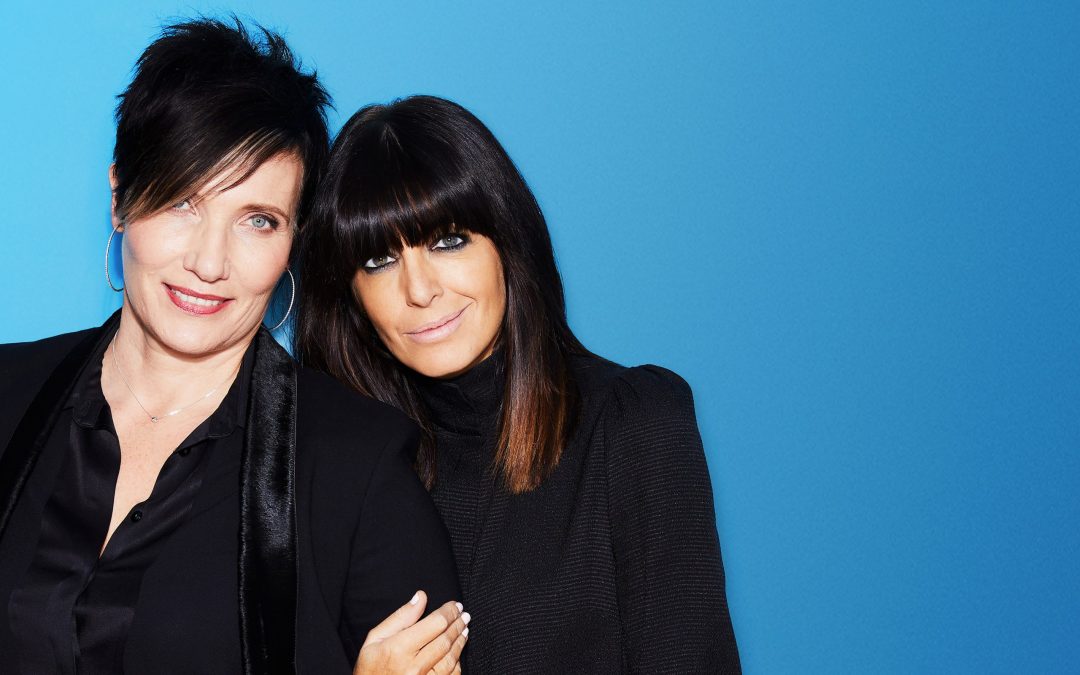Claudia Winkleman and Tanya Byron on their mental health podcast
Claudia Winkleman and clinical psychologist Tanya Byron talk to Rachel Dobson about How Did We Get Here? – their thought-provoking and entertaining new podcast from the therapist’s couch

10 minute read
The queen of light entertainment, Claudia Winkleman, is stuck in the lift. Her friend and podcast co-host, clinical psychologist Tanya Byron, is cracking up on the other side of the door. ‘She didn’t wait for the clunk,’ says Tanya. ‘People who are really intelligent like Claudia don’t read the signs in lifts telling you to wait for the lift to stop before opening the door – that’s how brilliant she is.’
The friends are both smart, funny and intrigued by people and their behaviour. They have come together to work on a compelling new podcast, How Did We Get Here?, 16 years after meeting on House Of Tiny Tearaways, a reality show that helps parents deal with their children’s problematic behaviour.
In the intervening years, Claudia has gone on to co-host Strictly Come Dancing and Best Home Cook and Tanya has made Am I Normal?, as well as writing five books, including the autobiographical The Skeleton Cupboard: The Making Of A Clinical Psychologist (Pan Macmillan, £8.99).
Claudia is married with two sons, 16 and eight, and a daughter, 13, and Tanya is married with two children in their 20s. The pair kept in touch after working together, then inspiration struck Claudia on Christmas Day in 2018.
‘I had this insane idea for a podcast and called Tanya straight away: ‘‘Tan, put the turkey down and step away from the bread sauce,”’ says Claudia.
‘I saw who was calling and let it go straight to voicemail,’ laughs Tanya. ‘It was Christmas Day! But I took no persuading. Who doesn’t want to work with Claudia? Joking aside, there are lots of reasons we’re friends, but also we’re both really curious about people.’
The interview
Q. Tell us about the first time you worked together…
Claudia: We met on Tearaways and, for me, it was love at first sight. I would watch Tanya work and I had a baby who was under one at the time.
Tanya: She was singing A Whole New World with her son daily and, when we were filming, she missed him and would make me sit on the floor and sing it with her. It was the only way I could get her to work. There were some separation issues; he was a baby.
Claudia: So many things Tanya said then were so genius that it didn’t just help me, it helped my whole friendship group. I’d go home and say, ‘It’s fine to say no – because Tanya says it’s fine.’ I’d use her guidelines all the time.
Tanya: Her children are really, really nice – and I don’t have to say that!
Q. With a clinical psychologist on speed dial, is it difficult not to ask her for advice all the time?
Claudia: We don’t often talk about each other’s lives; we’re mostly laughing a lot. Last year, we were in my kitchen having a typical conversation about how not to use plastic and Post-it notes, while I was making an omelette and tracking my son on my phone. Jake is 16, had been to football and I was tracking him. It was raining, he was going past a Subway and I thought I could put £7 on his card so he can get a chicken tikka, then I thought I should record Arsenal for him, because they were playing and maybe I should send him an Uber. I don’t like him to be out in the cold and I couldn’t confirm whether he was wearing a vest.
Tanya: So, she’s saying all this, and she’s making me an omelette, doing lots of different things at once. And I said, ‘You’re curling.’
Claudia: I have no idea what she’s talking about – I never curl my hair! But she explains it’s like the winter Olympic sport where people brush the ice in front of the putt; parents smooth out everything in front of their children, so they can just glide forward. And I said, ‘What’s your point?’ as I turned on the Breville to make a toastie for when Jake got home. I admitted that I am indeed a curling parent, but I’ve continued anyway and I still track Jake. I know he doesn’t really want me to; he’d have been better off being caught in the rain, being a bit hungry, walking home and watching Arsenal on catch-up, I would now argue – check out my growth!
Q. In the podcast, Claudia, you have a chat with the case study before they meet Tanya and you admit you often think you’ve got to the bottom of the issue…
Claudia: I’ll come out feeling certain about what Tanya is going to say to them but, after 45 minutes with her, something unforeseen and that I could not have imagined happens. It’s magic to hear her work. Tan would never say this herself but what she does is extraordinary. We should probably make it clear that in How Did We Get Here? , Tanya is not treating people, she’s having a conversation.
Tanya: Claudia is really good at what she does. Those first 15 minutes are absolutely fascinating for me because the way she looks at things just helps me position myself in terms of what I’m going to do next. She’s very good at getting to the point and distilling it, and letting me know what the person wants, which is quite difficult. Plus, she makes people feel comfortable. I go on to have a psychological conversation to help people get a different perspective and move things on… to think about where they can go next with something that’s become quite stuck.
I’ve just written a case for my newspaper column about a mother who is worried because her son is obese and she doesn’t know how to help him. She and her husband had given him money a few years ago to lose weight and he’d lost weight, but it’s piled back on. The point is that anyone can lose weight, anyone can stop smoking, anyone can stop drinking, anyone can change their behaviour, but how do you maintain that behaviour change? Maintenance is behind what drives behaviour in the first place. In order for change to happen, you have to understand how you got to that place initially.
Claudia: Tanya once said that we all know what we’re doing wrong but most of us don’t know why, which is a real nugget.
Q. You cover domestic violence, PTSD, ADHD, separation anxiety – a range of topics – but one that really stands out is the conversation with Jack, who wanted to work out his relationship with his father.
Claudia: Lovely Jack. I saw Tanya briefly after my chat with Jack and said, ‘You’re going to have to teach him how not to see his father,’ but then things took a different turn. I’m in another room, often crying, but maniacally writing notes, enthralled by how things are working out.
Tanya: I’ll say to Claud, ‘We’re looking at a mountain and I’m looking out of this window and you’re looking out of the other window…’ She’ll describe what she’s seeing, and I’ll say, ‘Hold on, come over here and look at it from this perspective.’ Then she’ll say, ‘Now I get it! It’s a different view and a broader understanding of how you’re going to climb the mountain.’ We’re not trying to solve the nation’s mental health with this podcast, it’s more about how we think around a problem.
When people lived more in communities and families lived in each other’s houses, there was more of a sense of sharing and talking, and that’s what we’re doing here and what we do as friends. This is what we enjoy doing together. We’re both fascinated by why people do what they do and the human condition, but we come at it from different angles.
Q. Claudia, I feel as though you hide your Cambridge degree in theology and history of art… Why is that?
Claudia: It’s not necessary to talk about it.
Tanya: It isn’t necessary to talk about it because if you’re confident and you like what you’ve got and who you are, you don’t need to talk about it. She did well in the husband department, she’s doing well in the kids department and her work is great. Now she needs to do her superstition thing…
Claudia knocks on the table twice and tweaks her nose for luck, smiling. And, with that, the new stars of the podcast world are off. ‘How Did We Get Here?’ is out now through several podcast providers.
The podcast
How Did We Get Here? The series, hosted by Claudia Winkleman and therapist Tanya Byron, explores family life and relationships, from parental estrangement and gender identity to inheriting mental health issues and beyond. Claudia introduces the anonymous person and listens in as Tanya explores their story and helps fi nd solutions to their problems.
Claudia’s skill is getting people to relax and open up to Tanya and the listener is taken on an emotional journey with the interviewee, as Tanya peels back the layers to fi nd the truth.
At the end of each episode, the pair have a light-hearted, but insightful, chat about the issue and share useful links and contacts for listeners.
Subscribe to Psychologies!
Subscribe to our life-changing magazine today for powerful ideas, tools, life hacks, advice and and interviews. Invest in you and subscribe today. See our latest offers here.
Photograph: Matt Monfredi








